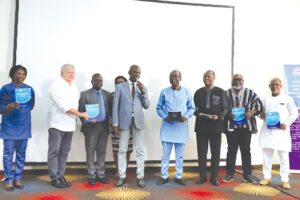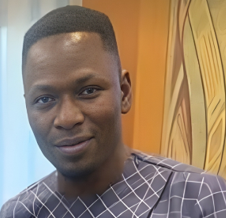By Juliet ETEFE
A national education report has revealed a significant steady increase in access to education across all levels in the country; however, concerns over quality still persist.
Released by the Ghana Statistical Service (GSS), the report highlights substantial improvements in Gross Enrolment Rate (GER) and Net Enrolment Rate (NER) at the kindergarten, primary, junior high school (JHS) and senior high school (SHS) levels.
Despite these gains, disparities in quality indicators such as Pupil Teacher Ratio (PTR), Pupil to Trained Teacher Ratio (PTTR) and core subject pass rates present challenges which demand urgent attention.
The report, Access to and Quality of Basic and Secondary Education in Ghana (2000 – 2023), presents statistics on enrolment, teacher availability and student performance in core subjects at JHS and SHS using data from the Education Management Information System (EMIS).
Findings indicate that between 2001 and 2003 the kindergarten gross enrolment rate more than doubled from 51 percent to 122 percent, primary increased from 80 to 90 percent, JHS increased from 64 to 98 percent and SHS tripled from 25 to 72 percent.
Despite high GER, statistics on net enrolment rates which measure age-appropriate enrolment indicate that significant proportions of pupils at all four levels of education were not within expected ages. This tends to shorten their working years, affecting pension contributions.
It added that in 2023 kindergarten NER was 66 percent, indicating that two in every three children aged 4 to 5 years were enrolled in kindergarten; eight in every 10 children (80 percent) 6 to 11 years were enrolled in primary school; and at JHS (47 percent) level, less than half of the children 12 to 14 years were enrolled at the age-appropriate level.
Gender disparity
Gender disparities in education access, according to the report, have decreased over time with gender parity being achieved at the primary level. However, gender gaps persist in the quality of education as measured using core subject pass rates.
The gender differences in pass rates are more pronounced in English and Mathematics compared to science and social studies at both JHS and SHS levels.
In 2021 WASSCE, for instance, boys (70 percent) outperformed girls in mathematics (60 percent) while English pass rates were higher for girls (60 percent) than boys (50 percent).
Quality across regions
The report further noted that quality of education records stark variations across regions in comparison with access to education.
“For instance, pupil-to-trained-teacher ratios in the Northern, North East and Savannah Rgions, are greater than 50 pupils per trained teacher – more than twice that of Greater Accra (25 pupils per trained teacher).
“Disparities were also observed in pass rates for core subjects as the Bono Regions recorded the highest WASSCE Mathematics pass rates in 2019, almost five times the rate in North East Region (21.0 percent) which recorded the lowest pass rate.
“Larger disparities are observed for English pass rates, with the highest region, Bono (75.3 percent) recording pass rates more than 10 times higher than the rates in two regions – North East (5.1 percent) and Savannah (8.0 percent),” it stated.
Regionally, Greater Accra and Ashanti Regions continue to lead in gross enrolment rate and net enrolment rate at both primary and secondary school levels. Eastern and Central Regions have also shown improvements, particularly in NER, indicating steady progress in ensuring more children are enrolled at the appropriate age.
In contrast, Northern, North East and Savannah Regions remain below national averages, with persistent enrolment gaps that suggest ongoing challenges in access to education.
The Gender Parity Index (GPI) has improved in most regions, with Volta and Bono Regions recording near equal participation rates between boys and girls.
However, disparities remain in Northern and Upper West Regions, where female participation still lags. On teacher quality, the Pupil to Trained Teacher Ratio (PTTR) remains a concern in the northern regions, where shortages of trained teachers continue to affect education quality.
Greater Accra and Western Regions recorded relatively better PTTRs, but improvements are needed across the board to meet policy targets.
Regarding pass rates, the Greater Accra, Ashanti and Bono Regions achieved highest pass rates in both BECE and WASSCE, reflecting relatively better learning outcomes. Conversely, the Northern, North East and Savannah Regions recorded the lowest pass rates in examinations, although the performance of North East in BECE is among the highest.
Policy targets
The report also provided information on progress toward policy targets in the Education Strategic Plan (2018 – 2030) and finds that while policy targets have been reached at some levels for gross enrolment, gender parity and pupil to teacher ratios, national targets for net enrolment have been missed across all four levels of education.

Minister for Education Haruna Iddrisu in his keynote address, after government statistician, Prof. Samuel Kobina Annim highlighted key takeaways from the report, noted that the findings will provide invaluable insights to inform discussions and policy decisions of the National Education Forum Planning committee – “ensuring that our strategies are grounded in data and aligned with national priorities”.
The minister stressed a need for greater investment at the foundational level to address disparities – particularly for children with special educational needs – and bridging the quality gap between rural and urban education as well as public and private institutions.
He noted that while efforts have been made to expand secondary education, the country has not adequately prepared its tertiary institutions to absorb the rising number of students.
Citing a UNESCO report, he highlighted overcrowded classrooms, limited lecture halls and inadequate hostel accommodation as major concerns affecting learning at the tertiary level.
To address these challenges, he announced government’s plan to operationalise the National Research Fund this year and introduce a PHD Scholarship Initiative through the Ghana Education Trust Fund (GETFund) to provide public universities with financial support for training undergraduate students, with the aim of strengthening faculty development.










